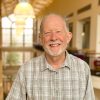This article is more than 5 years old.
CoAuthor: Barry Davis
Craig and Rachel lead a session on book repair
At 9 am on Saturday, November 21, we held the first public training session for the LSTA Outreach Grant at the Central Branch of FCPL. Audra Eagle, Giz and Craig have been working on this training for several months, and held a pilot session at ZSR in October. For the public sessions, Craig recruited his teaching buddy, Rachel Hoff, Preservation Specialist at UNC Medical Sciences Library. The attendees represented small historical groups across Forsyth County and had a strong interest in the preservation of their materials. Rachel spent the first 2-hour session covering the basic concepts, terminology and best practices used in preservation. Audra and Craig chimed in with any ideas or unique experiences they had as the session progressed. Craig was amazed at how much knowledge these ‘lay’ practitioners had. Rachel discussed temperature, relative humidity, light and the concepts surrounding the idea of acid-free and archival materials. We discussed archival adhesives and various forms of housing historical documents as well.
After a great lunch at Bibb’s across the street, we held the hands-on preservation portion of the training. Craig had carried his traveling boxes of book repair materials over to the library in the morning. We set up a work station for each person with PVA adhesive, a bone folder, scissor, heat-set tissue and small traveling irons. We began with the easiest repair tipping-in a loose page and progressed to more complicated repairs. The other repairs we showed were repairing paper tears and tightening loose hinges. One of the ideas we stressed was boxing materials. This is a simple, non-invasive approach to preserving materials that helps protect the item from mechanical damage, humidity and light. We shared resources for obtaining these supplies as well. The crowd seemed pleased with both sessions and they took a break to prepare for Session #3- Digitization with Barry Davis.
Barry Discusses Digitization Issues
During the digitization session, the group walked through the uses of each piece of equipment supplied by the LSTA grant, as well as general best practices for digitization. This included flatbed scanning, 35 mm slide scanning, and video and audio recording conversion. Each of these processes has a unique machine connected to a PC as well as specific software to use in order to capture and preserve the materials represented, including books, pictures, film, slides, audio cassettes, and VHS tapes. The ideas of archival versus public display file formats (TIFF vs. JPEG, AVI vs. MPEG, WAV vs. MP3, etc.), resolution, file size, and data backup/storage were some of the hot topics that the group discussed during this walkthrough. The group seemed genuinely interested in the technology and processes, asking great questions and thinking out loud the projects they could undertake using such equipment, marking a great end to the day’s activities.



2 Comments on ‘“Preserving Forsyth’s Past” LSTA Grant Workshop’
Everyone did a fantastic job pulling this workshop together. The participants were very engaged and I think we will have capacity crowds for the next three rounds. Thanks Giz, Craig, Barry, Audra and Rachel for a successful program.
Great workshop!